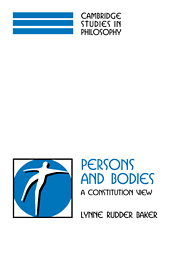6 - The Importance of Being a Person
Published online by Cambridge University Press: 05 June 2012
Summary
According to the Constitution View, what is ontologically most important about human persons is that they are persons. According to the Animalist View, by contrast, what is ontologically most important about human persons is that they are animals. In this chapter, I want to show the difference that being a person makes.
It is the first-person perspective, in virtue of which we are persons, that gives rise to what matters to and about us. First, we matter to ourselves in a way that, logically, animals that lack first-person perspectives cannot matter to themselves. Nonhuman animals can attempt to survive and reproduce, but only beings with first-person perspectives can have conceptions of their own futures. Only persons can have fears and hopes about the future, and only persons can attempt to shape their futures according to their own ideas of the kinds of beings that they want to be. In short, animals that do not constitute persons cannot be important to themselves in the same way that persons are important to themselves. This is so because the first-person perspective allows us to think about, and conceive of, ourselves in a unique way.
So the significance, to persons, of being persons is simply incalculable. And it is difficult to see how to dismiss this apparent significance as merely parochial. I suspect that such dismissal requires a degree of selfdeception. We may gaze at the sky and think how vast is the universe and how inconsequential are humans, but that does not (and should not!) stop us from worrying about how we are going to take care of our aging parents.
- Type
- Chapter
- Information
- Persons and BodiesA Constitution View, pp. 147 - 164Publisher: Cambridge University PressPrint publication year: 2000
- 1
- Cited by



